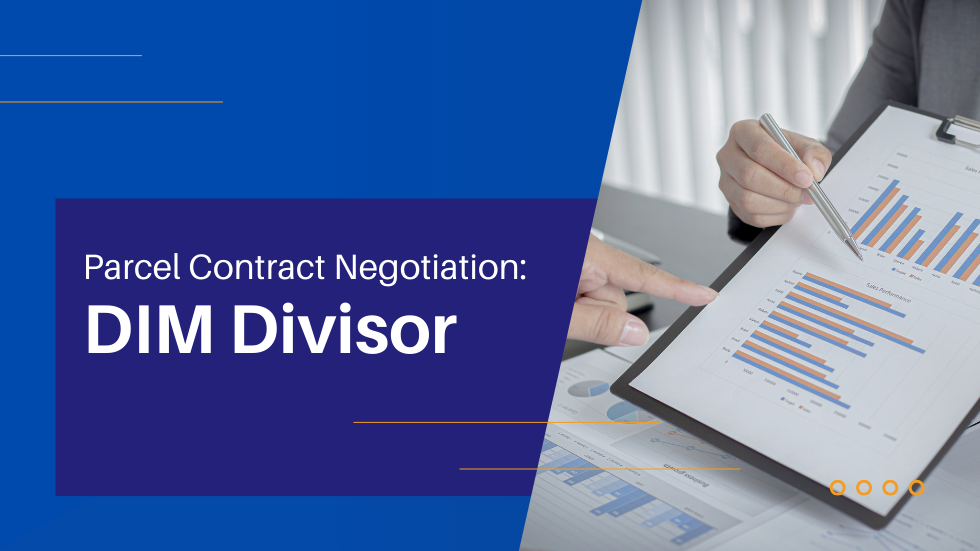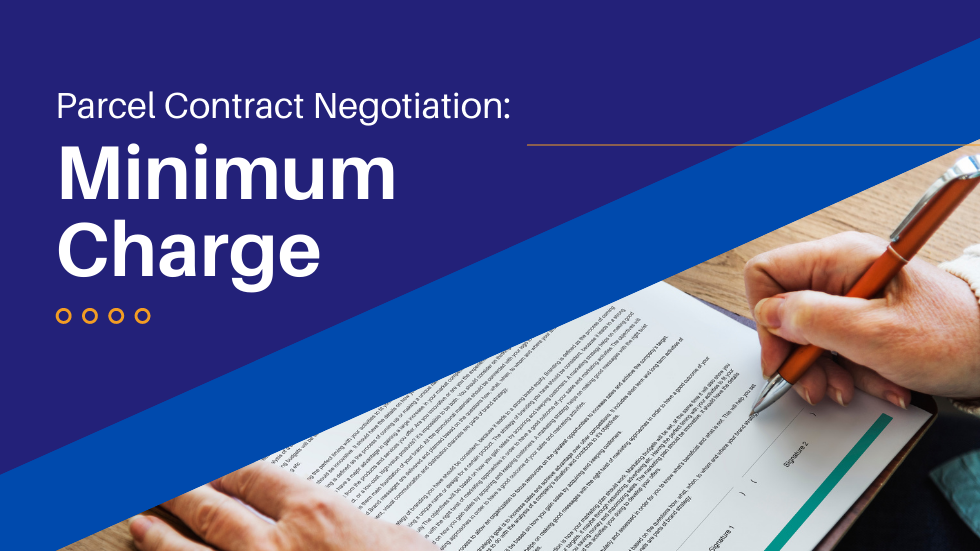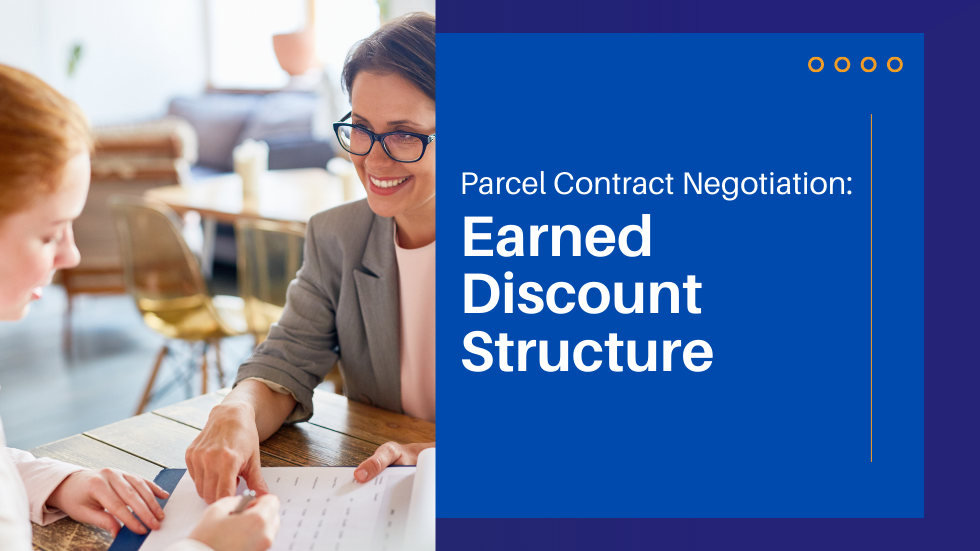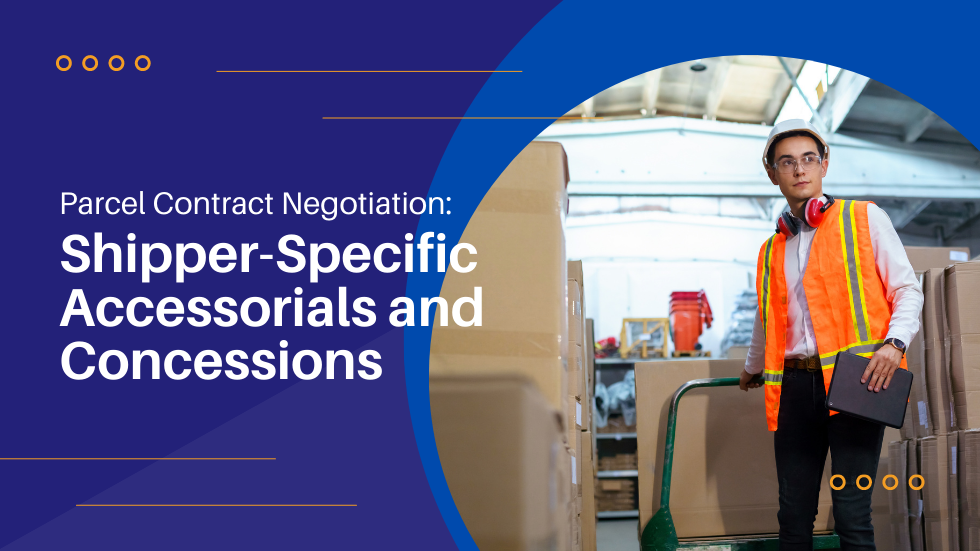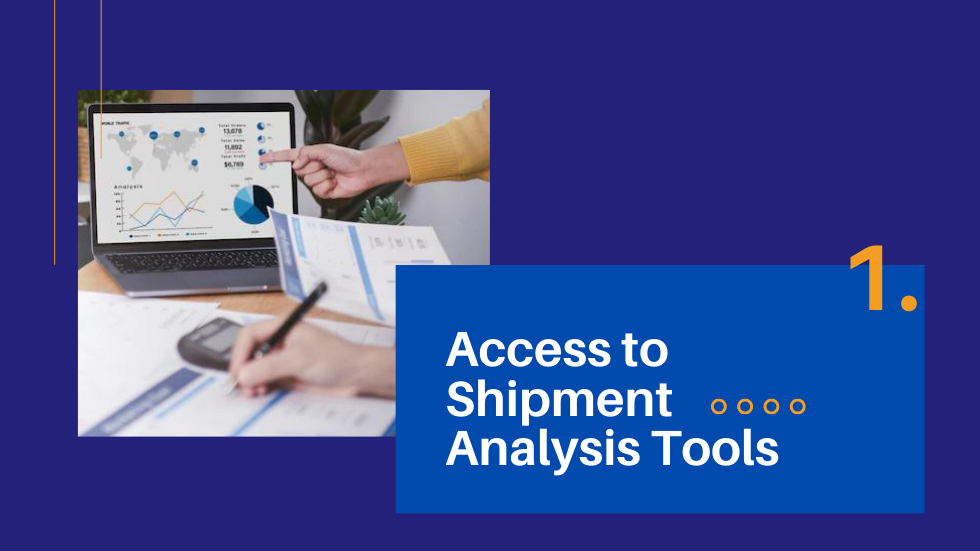Understand the Fine Print, Improve Your Parcel Contract Negotiation
Posted on May 31, 2023
Written by Mickey Powers
If your business ships products, you know how complicated parcel agreements can be and how important it is to get them right.
You already have so much on your plate, and it’s tempting to glance at the documents, sign and initial, and move on to other items on your to-do list.
If this is your approach, you could be spending more than you’d like (and more than you should) on parcel rates.
Especially when you consider the lack of competition in the industry and volume-based incentives, service agreements typically lean in the carriers’ favor.
However, the better you understand the nuisances of your carrier contracts, the better it will allow you to identify the specific ways in which the carrier might be overcharging you.
You can then negotiate better rates and a fair contract that benefits both parties.
In this guide, you’ll learn more about what to look for when looking at the complexities of your parcel pricing agreements.
You’ll also discover some specific steps you can take to experience more significant parcel shipping savings in the future.
What’s Hidden in the Fine Print?
Let’s start with the details you might find in the fine print of your carriers’ contracts.
Stop skimming!
Here are some of the most critical factors to look for during contract reviews and parcel cost renegotiations.
Parcel Contract Negotiation: DIM Divisor
DIM is short for Dimensional. Carriers use the DIM divisor or DIM factor to determine the best way to calculate the dimensional weight of a package (which influences how much they charge you for delivery).
Carriers set this number, and it represents cubic inches per pound.
It can also vary quite a bit from company to company.
If there’s a difference between your package’s DIM weight vs. your actual weight you will be invoiced for the larger of the 2 — you could easily overspend on shipping costs because of not understanding the impact of your DIM Factor and what DIM Factor was available to you.
If your billed weight is constantly being impacted negatively, you may be able to renegotiate it to reduce shipping costs.
Note: you will also need to understand the impact of “rounding” and know what % of invoices are being impacted by this. In some cases, this may look like DIM impact when it actually isn’t.
Meaning a package not impacted by DIM weight that weighs 10.1 lbs. will be billed by the carrier at 11 lbs.
Parcel Contract Negotiation: Minimum Charge
As the name suggests, the minimum charge is the lowest amount you will pay to send any package via a particular carrier.
This charge goes by a couple other names, including the following:
● Minimum Package Charge
● Minimum Net Charge
The minimum charge has risen steadily over the last several years.
It currently sits at $10.10 for both UPS and FedEx Ground Commercial & Residential.
Minimum charges can interfere with the discounts you’ve previously negotiated with carriers because contracts generally include a clause saying the shipper will pay whichever number is greater — the negotiated rate or the minimum charge.
You must look closely at the number of shipments being impacted by your minimum charges to ensure you’re getting what you deserve and benefit from the discounts offered to you.
It may not benefit you to renegotiate your discounts, instead focus on lowering your minimum charge application.
Parcel Contract Negotiation: Earned Discount Structure
FedEx and UPS, as an example, offer additional discounts to be earned based on your shipping volume over a specific period of time, typically a 52-week rolling average.
These programs are divided into tiers, each offering a different incentive amount based on volume.
Carefully review the carrier’s earned discount program structure so you know what kind of savings you qualify for and how your shipping rates will be affected by either increases or decreases of your volume.
It would be best if you also took note of factors that could cause you to drop in and out of specific tiers (and therefore affect your discounts). The carriers typically know about where you will fall in the incentive tiers and structure them so that any dilution in volume will have a large impact on your incentives, meaning far less discount application. While increases in volume carry very little additional incentive.
Parcel Contract Negotiation: Shipper-Specific Accessorials and Concessions
Accessorials and concessions are additional charges that might be added to your bill based on various factors.
The following are some examples of accessorials charges we see having a large impact on shippers, every one of which is negotiable.
- Additional Handling
- Delivery Area Surcharge
- Fuel Surcharge
- Large Package
- Residential
- Dangerous Goods
Understanding the impact of these charges is instrumental in negotiating your parcel contract(s). We have seen these charges re spent over 30% of the total charges incurred by some of our client(s). Remember, they are negotiable!
Benefits of Outsourcing Parcel Contract Negotiation
You might be overspending on shipping costs in many ways without even realizing it.
Careful contract reading and negotiation can help you to optimize parcel spending and reduce costs across the board.
However, the problem is that most shippers need more tools & benchmarks for lowering expenses.
If this situation sounds familiar, consider outsourcing carrier contract optimization to a third-party transportation management company.
When you trust another organization with this process, you gain several benefits, including the following:
1. Access to Shipment Analysis Tools
Transportation management professionals typically have access to a variety of tools that help them evaluate the nuisances of your contracts, assess different carrier options, including the USPS and Regional Parcel Carriers, and provide you with a better understanding of the entire shipping process.
For example, many transportation management software solutions can conduct a carrier contract analysis based on your business’s specific shipment characteristics, such as service levels, zones, DIM, minimum charge and accessorials used.
These in-depth analyses help them evaluate contracts thoroughly and look for ways you might be overcharged.
They can then focus on these aspects and make a plan to help you get a better rate.
2. Options to Compare Various Proposals
Another benefit of utilizing managed transportation services is that these companies have the tools and human resources to compare various proposals more efficiently.
Most carriers have a team of pricing experts to help them maximize profits.
By partnering with a transportation management company, you can have your own team of experts by your side.
Their specific expertise in comparing various carrier -proposals (as well as combinations of carriers) can level the playing field for individual shippers like you.
They can quickly review multiple carrier proposals and examine them to determine which company offers you the best deal.
These comparisons also give you more negotiating power.
3. Knowledge of Industry Benchmarks
Third-party transportation management professionals also have years of experience and comprehensive industry knowledge — including specific benchmarks for rates and performance.
Your transportation management partners can use this information to compare carriers and their contracts, ensuring they’re charging you fairly and providing you with quality services that justify their prices, based on current market conditions.
The information gathered through benchmarking will empower you during the negotiation process and help you get the rates and terms you want and deserve.
4. Contemporary Pricing Knowledge
Finally, when you outsource contract negotiation to a third-party transportation management team, you can trust that you’re getting access to the most up-to-date pricing information.
When your contract is reviewed or audited by a shipping expert with current pricing knowledge, you may find out what a reasonable price looks like for shippers like you. In many cases you only have access to your contract and what you have negotiated, however the 3rd party consultant may have reviewed and analyzed hundreds of contracts over the last few months.
These insights will help you avoid being taken advantage of by carriers and set your business up for increased savings and profitability in the long run.
Let Broussard Logistics Help You Optimize Carrier Contracts
By looking closely at the fine print during a parcel invoice audit or contract negotiation meeting, you can save a lot of money while still delivering goods to your customers on time and intact.
Now that you know what to look for, it’s time to use the contract-reading guidelines discussed above for more efficient shipping contract optimization and enhanced parcel spend management.
Want to increase your savings further?
If so, consider working with a third-party provider that specializes in auditing and negotiation. They will simplify the process for you, ensure you’re treated fairly, and help you move forward with confidence. Broussard offers a no obligation cost analysis of your current contracts in order for you to determine if outsourcing to the 3rd party is impactful.
Our analysis takes ~10 business day and includes the following:
- Full Distributions Analysis
- Rate Benchmarking
- Savings Opportunity
If you need help from a transportation management solutions provider that specializes in contract negotiation and has decades of experience in the shipping industry, the Broussard Logistics team is here for you.
Contact us today to learn more about our solutions or to schedule your no obligation analysis.

